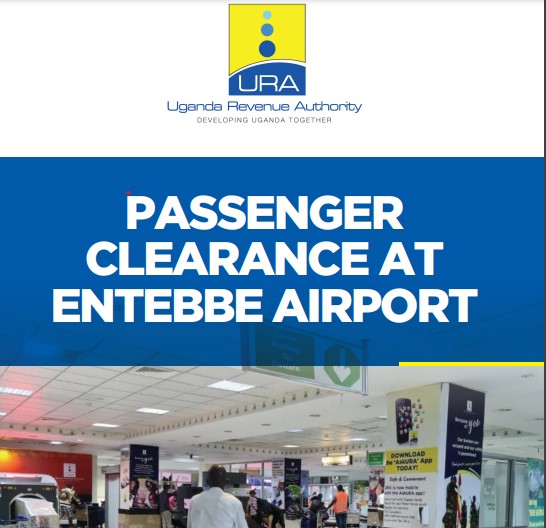Any arriving passenger at Entebbe International airport, upon collection of his or her personal baggage, will either be cleared through the green or red channel.
Please note: Irrespective of the channel of clearance, all passenger baggage will be subjected to non-intrusive inspection (scanner). If from the scanner images, any items are found concealed (hidden) the baggage will be subjected to a physical examination by a customs officer in the presence of the passenger.
Passengers with nothing to declare to Customs (URA) or with baggage consisting of only goods within the prescribed passenger allowance (i.e. new goods for personal use not exceeding the value of USD 500) shall exit the passenger terminal through the green channel.
Please note:
The passenger should have an authentic receipt confirming the value that corresponds with the items.
Personal effects which have been in use and accompany the passenger are exempt however personal effects which are new should not exceed the value of USD 500 for each passenger.

Passengers with dutiable or restricted goods shall go through the red channel to declare their goods through a simplified declaration form (PB4), pay appropriate customs taxes, and exit the terminal with their goods (cargo).
NOTE: The PB4 will only be used to declare goods whose value does not exceed USD 2,000. Goods whose value exceeds USD 2,000 will require the services of a clearing agent and clearance will be done through the cargo terminal.

What are dutiable goods?
These are goods that you have to pay tax on when you bring them into a country.
What are restricted goods?
These are goods, whose importation requires clearance from a regulatory authority or are subject to quantitative restrictions.
Please note: Passengers who come in to the country with money in excess of USD 10,000$ must report to customs and declare the money in their possession.
The following items are restricted and shall require clearance from the designated government agencies before releasing by customs at the airport:
| S/N | Item | Government agency concerned |
| 1 | All medicines | National Drug Authority (NDA) |
| 2. | Arms and ammunition and military stores | MINISTRY OF INTERNAL AFFAIRS (MIA) |
| 3. | Betting and gaming equipment | LOTTERIES AND GAMING BOARD |
| 4. | Chemicals | Uganda National Bureau of Standards (UNBS) |
| 5. | Drones, explosives | Uganda Peoples Defense Forces (UPDF) |
| 6. | Minerals | Ministry of Energy |
| 7. | Live insects, birds, animals, and animal products. Live plants and plant products. | Ministry of Agriculture, Animal Industry and Fisheries (MAAIF) |
No. The arriving passenger shall personally (not through a clearing agent) present his/her baggage before a customs officer on duty, who shall examine the same in the presence of the owner.
What happens if the goods are confirmed to be dutiable/taxable?
- The customs officer shall deposit the goods with customs (URA) and issue an assessment of the taxes payable.
- Upon payment of the assessed taxes, the customs officer shall issue a release of the goods and the passenger will be allowed to exit with his/her goods.
- As long as the passenger has received a release order- he/she has 14 days to take them out.
What if the passenger does not have taxes readily available?
If the passenger does not have taxes readily available, the goods shall remain in customs custody and the passenger will be issued a goods deposit note which such a passenger shall present when he/she is ready to clear the goods.
- Goods that have not paid tax may remain in customs custody for a maximum of 30 days from the date the passenger is issued a goods deposit note
- The goods shall be kept in the passenger terminal for the first 7 days without charge. Please note: Perishables or animals may be disposed of or sold without notice irrespective of 7 days allowance.
- After the 7 days without charge, the goods may be transferred from the passenger terminal to the cargo terminal where they shall be charged a rate of 0.3 USD per cubic meter per day.
- For the goods to be cleared from the cargo terminal, the Tax Identification Number (TIN) of the passenger and the appointment of a licensed clearing agent by the passenger shall be required.
- After the lapse of the 30 days, a notice for auction shall be issued for another 30 days, after which the goods may be auctioned.
The passenger will be guided to obtain clearance from the relevant authority and the goods shall remain in customs custody until such clearance has been obtained and delivered to customs. The passenger will be issued a goods deposit note.
If the goods in the passenger baggage are prohibited, the passenger will be charged for importing prohibited items into Uganda in line with the law (East African Community Customs Management Act).
These are goods whose importation or exportation is completely not allowed by any of the laws in force in Uganda.
The following items are prohibited from importation in Uganda;
- Used motor vehicles above 15 years
- Used motor vehicle tyres
- Cosmetics with hydroquinone and mercury
- Monofilament fishing nets
- Smokeless and flavored tobacco e.g. shisha
- Pornography
- Narcotics
- Illicit goods e.g wildlife trade goods like ivory, animal skins, etc
- Polythene bags.
- Used undergarments to give out as donations
- Used electronics (With Effect From 2009 ) which include:
(a) Computers including monitors
(b)Laptops
(c) Television sets
(d) Fridges
(e) Deep freezers
- Upon being issued with an assessment of taxes payable, the passenger may pay through any of the following options; (a) Online payment options (VISA, MasterCard, American Express, Union Pay, Mobile Money (b) Payment Transfer Instructions (EFT, RTGS and Swift) (c) Other Payment Options (Demand draft, Point of Sale) (d) Any bank of his/her choice in Uganda
- After making a payment, the passenger should ensure they get a receipt as proof from whichever mode of payment they opted for.
- URA does not issue receipts. Once the passenger completes payment, URA receives a notification immediately.
- Upon receiving a payment notification, URA verifies the payment and issues the passenger a release order.
Please note:
- All payments are done electronically.
- URA issues an assessment and a release order- not a receipt.
- No payments should be given to URA officials, in cash or in kind.
Passenger exempt goods are goods accompanying the passenger and are for his/her personal use. These goods are not charged taxes and fall within the allowable limits as below;
- The passenger should have been outside the country for a period of 24 hours and above. (a) The goods should be the property of and accompany the passenger. (b) The goods should be for the personal and household use of the passenger. (c) Personal effects which are new and accompany the passenger should not exceed the value of USD 500
- The goods should be of such kind and in such quantities as the customs officer may allow.
- Spirits (including liquors) should not exceed 1 liter or wine should not exceed 2 liters.
- Perfumes and toilet water should not exceed all together half a liter (500mls) of which not more than a quarter (125ml) may be perfume.
- Cigarettes, cigars, cheroots, cigarillos, tobacco, and snuff should not exceed all together 250 grams in weight.
- Samples and miscellaneous articles not imported as merchandise (goods for sale) should in the opinion of the customs officer have no commercial value.
- Consumable items and non-alcoholic beverages imported by a passenger on a temporary visit in Uganda (not exceeding three months) should be in such quantities and of such kinds as the customs officer may consider consistent with the passenger’s visit.
- A security deposit may be required for non-consumable goods imported for a passenger’s personal use which he/she intends to take out when leaving at the end of the temporary visit in Uganda. For example; filming equipment.
NOTE: Donations and gifts pay taxes unless exempt.
Returning residents enjoy tax exemptions on the following items;
- Wearing apparel.
- Personal household effects.
- 1 used motor vehicle which the passenger has used and owned for at least 12 months excluding buses and mini buses, goods carrying vehicles exceeding 2tonnes.
NOTE: This exemption is for passengers who have attained the age of 18years.
Disclaimer: This information is strictly for creating awareness and providing guidance to our clientele and is subject to change on amendment of tax legislation and any other regulations governing tax administration










